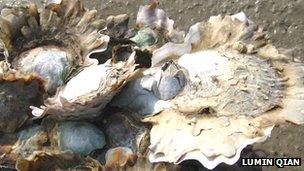Oyster genome mystery unravelled
- Published

Oysters thriving in an intertidal zone in China
A detailed map of the Pacific oyster genome has been unveiled by scientists.
The research, published in the journal Nature, external, shows how oysters manage to survive the harsh environment of the estuary and sea shore.
The mollusc has scores of genes that protect it from extremes of temperature and saltiness, where the land meets the sea.
Oyster farming is a multi-million dollar industry, centred around China, Japan, Korea and the US.
The genome map gives an insight into how the oyster became adapted to marine life, and how it formed its complex shell.
It also reveals secrets that may help scientists breed faster-growing oysters with a better survival rate.
A team of international scientists, from China, the US, and Europe, carried out the genome sequencing work.
Peter Holland, professor of zoology at the University of Oxford, and a co-author of the research, says the oyster has more than 80 genes that protect the oyster from stress.
It gives a fascinating insight into the life of a creature adapted to the intertidal zone, he said.
He told BBC News: "We can actually see in the genome a reflection of these adaptations.
"There's clearly been adaptations over millions of years to allow these animals to cope with an incredibly harsh environment."
The DNA sequence of the oyster will be compared with other mollusc genomes, including the California sea hare and the giant owl limpet.
The Pacific oyster Crassostrea gigas lives in estuaries, intertidal and subtidal zones.
Intertidal zones lie on the shore between the high and low tide marks, where animals and plants must cope with being submerged in salt water for part of the day and exposed to the Sun for the rest of the time.
Molluscs that are able to survive in this habitat also need to survive attack by a host of predators, from birds to small mammals.